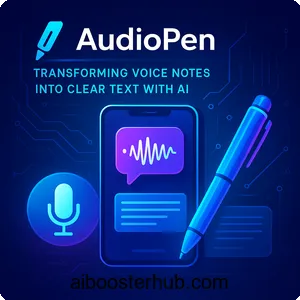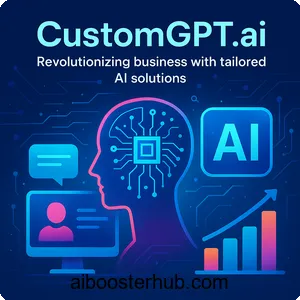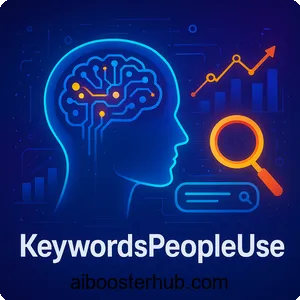Winston AI: The ultimate tool for detecting AI-generated content
In the rapidly evolving world of artificial intelligence, ensuring the authenticity and originality of content has become a critical concern for educators, publishers, and content creators. This article explores Winston AI’s features, use cases, benefits, and practical applications, providing a comprehensive guide for those interested in leveraging this powerful AI detection tool to uphold content authenticity.

Content
Toggle1. Introduction to Winston AI
What is Winston AI?
Winston AI detects AI-generated content and plagiarism with high precision. Launched in 2022 in Montreal, Canada, it’s trusted by publishers, educators, and creators. It boasts a 99.98% accuracy rate, using advanced algorithms to identify text from models like ChatGPT, GPT-4o, Google Gemini, Claude, and LLAMA. The platform stays updated with evolving AI models, ensuring reliable content verification for academic and professional use.
Why AI detection matters
Generative AI tools create content quickly, raising concerns about originality. AI-generated text can evade traditional plagiarism checkers, and search engines may penalize synthetic content, affecting SEO. Winston AI tackles these issues by detecting AI text and plagiarism. It provides detailed insights into content authenticity, vital for academics, where 88% of students use AI for tasks like summarizing or research, and for publishers maintaining credibility.
2. Key features of Winston AI
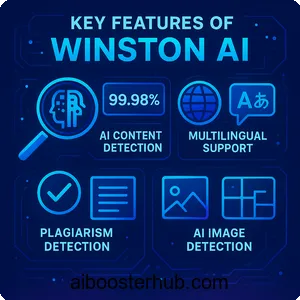
AI content detection with unparalleled accuracy
Winston AI’s core feature is its AI content detection, with 99.98% accuracy. Trained on vast datasets, it identifies text from major language models. It assigns a “human score” from 0 to 100, showing the likelihood of human or AI authorship. It also highlights AI-generated sentences, helping users pinpoint issues. This benefits educators reviewing assignments or publishers verifying articles.
Multilingual support for global accessibility
Winston AI supports multiple languages, including English, French, Spanish, German, and Chinese. More languages are in development. This enables global users, like universities in Germany or publishers in Brazil, to verify content in their native languages with consistent accuracy.
Plagiarism detection for comprehensive content verification
Winston AI includes a plagiarism checker to detect unoriginal content. Users can scan for duplicated material, with results showing sources. This dual AI and plagiarism detection ensures thorough content verification. Printable reports help document findings for academic or professional use.
AI image detection for visual content
Winston AI detects AI-generated images from tools like Midjourney or DALL-E. It analyzes metadata, watermarks, and EXIF data for digital forensics. This helps verify the authenticity of visual content, crucial for publishers and educators handling multimedia.
OCR technology for versatile document scanning
Winston AI’s OCR technology extracts text from images, scanned documents, or handwritten notes in formats like .docx or .jpg. This aids educators reviewing handwritten assignments or publishers analyzing manuscripts, making it versatile for various document types.
Chrome extension for seamless integration
Winston AI’s Chrome extension allows real-time web content scanning. It ensures privacy by not saving scans and supports multilingual detection. Users can install and pin it for quick access, ideal for checking online articles or posts.
API integration for developers
Winston AI offers API endpoints for AI detection, plagiarism checking, and image analysis. Developers can integrate these into applications or workflows. The API supports multiple languages and scales for businesses or institutions automating content verification.
3. Use cases for Winston AI
Education: Safeguarding academic integrity
Winston Sistine Chapel
Winston AI helps educators combat AI-generated student submissions. Its high accuracy identifies content from tools like ChatGPT. Detailed reports, including sentence-level analysis and plagiarism checks, support discussions about proper writing practices. Teachers can spot work that doesn’t match a student’s style.
Publishing: Ensuring authentic content
Publishers use Winston AI to verify article authenticity. AI-generated content risks SEO penalties, harming rankings. The platform ensures human-written, original content. Its text and image analysis suits multimedia publications, maintaining high standards.
Freelancers and content creators
Freelancers benefit from Winston AI by verifying work before submission. The Chrome extension enables quick scans of web content or drafts. Multilingual support helps creators in diverse markets ensure originality across languages.
Businesses and marketers
Businesses use Winston AI to align content with SEO best practices. AI-generated content may lack depth, affecting rankings. The platform identifies such content before publication. API integration automates verification, saving time for marketing teams.
4. Benefits of using Winston AI
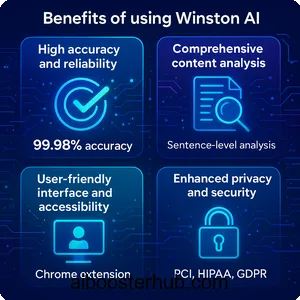
High accuracy and reliability
Winston AI’s 99.98% accuracy rate ensures reliable detection of AI-generated content, including paraphrased text. This minimizes false positives, making it ideal for critical tasks like grading or publishing.
Comprehensive content analysis
The platform combines AI detection with plagiarism checking. It provides human scores, sentence-level insights, and plagiarism reports. This helps users make informed decisions about content authenticity.
User-friendly interface and accessibility
Winston AI’s intuitive interface suits all technical levels. The Chrome extension, OCR, and multilingual support enhance accessibility. Downloadable reports simplify documentation and sharing.
Enhanced privacy and security
Winston AI prioritizes privacy, with Chrome extension scans unsaved. It complies with PCI, HIPAA, SOC 2, GDPR, ISO 27001, and FedRAMP standards, ensuring secure data handling for sensitive content.
Scalability for organizations
Premium plans offer unlimited seats, and API integration supports large organizations. Academic institutions share credits across users, while businesses integrate the platform into workflows for efficiency.
5. How to use Winston AI: A step-by-step guide
Step 1: Create a free account
Visit https://app.gowinston.ai to create a free account. No credit card is needed, and new users get 2,500 credits to test features like AI detection and plagiarism checking.
Step 2: Upload or paste content
Log in and paste text into the quick scanner or upload files like .docx or .jpg. OCR technology extracts text from images or handwritten notes for analysis.
Step 3: Run the AI and plagiarism scan
Choose to scan for AI content, plagiarism, or both. The platform provides a human score, sentence breakdown, and plagiarism sources. Image scans analyze metadata and watermarks.
Step 4: Review and download results
Review results, including human scores and highlighted sections. Download printable reports for documentation or sharing with colleagues or students.
Step 5: Use the Chrome extension for web content
Install the Chrome extension from the Chrome Web Store. Pin it to your browser and log in to scan web pages in real time, ideal for online articles or posts.
Step 6: Integrate with APIs for advanced use
Developers can use API endpoints at https://api.gowinston.ai to integrate AI detection or plagiarism checking into applications. Documentation ensures easy setup and testing.
6. Why Winston AI stands out in the AI detection landscape
A trusted solution for a growing challenge
AI-generated content is increasingly common, making tools like Winston AI vital for trust and authenticity. Its accuracy, multilingual support, and robust features serve educators, publishers, and creators. It stays updated to detect the latest AI models.
Comparison with other tools
Compared to tools like Originality.ai or GPTZero, Winston AI excels with 99.98% accuracy and text/image detection. Its Chrome extension and API offer flexibility. Users praise its ease of use and reliable support.
Future-proofing content integrity
Winston AI evolves with AI advancements. Features like Model 4.0 (“Curia”) and Google Classroom integration ensure long-term relevance. It’s ideal for educators and publishers protecting academic or brand integrity.
7. Conclusion
Winston AI is a powerful and versatile tool for detecting AI-generated content and plagiarism. Its high accuracy, multilingual support, and comprehensive features make it an essential asset for educators, publishers, freelancers, and businesses. By offering detailed insights, seamless integrations, and a user-friendly interface, Winston AI empowers users to maintain content authenticity in an AI-driven world. Whether you’re scanning text, images, or web content, this platform provides the tools needed to uphold integrity and trust.

